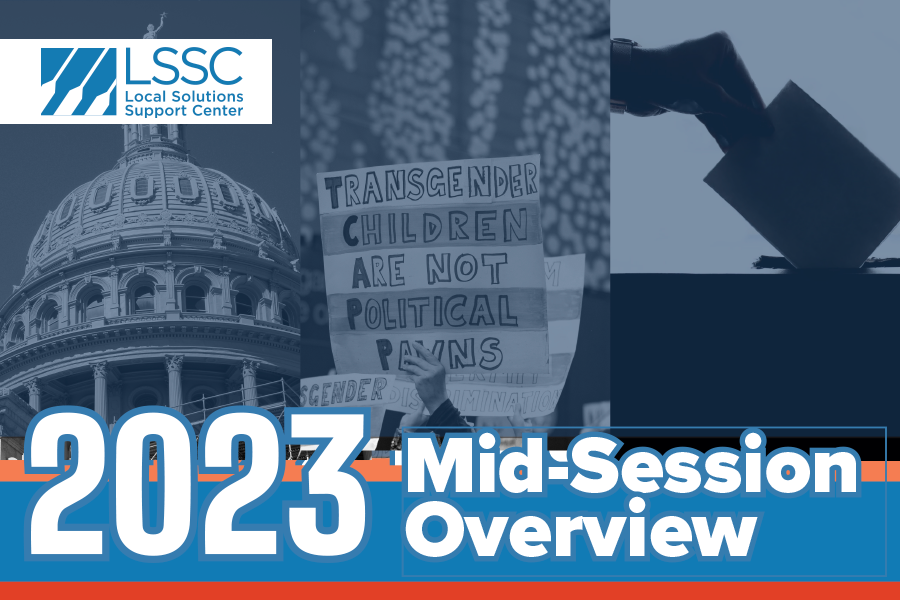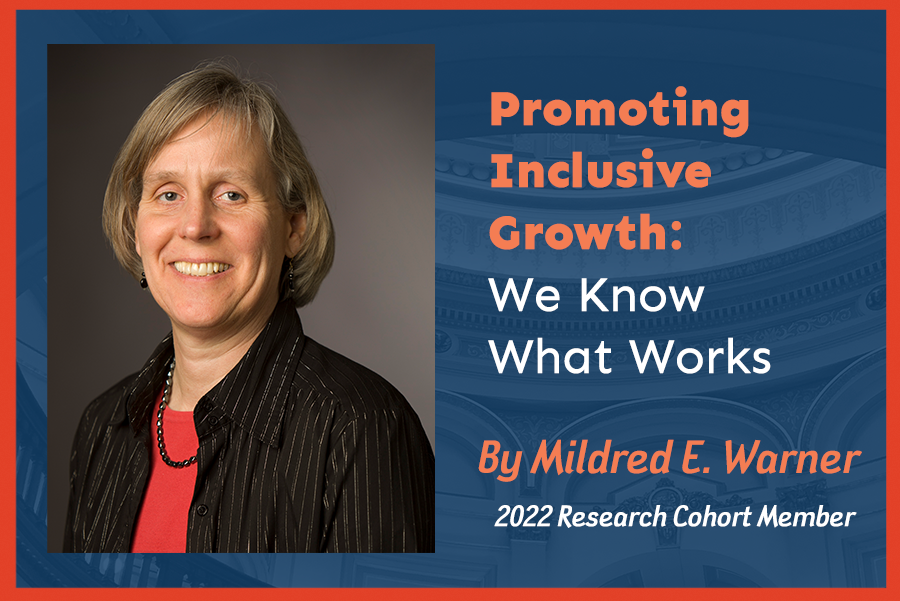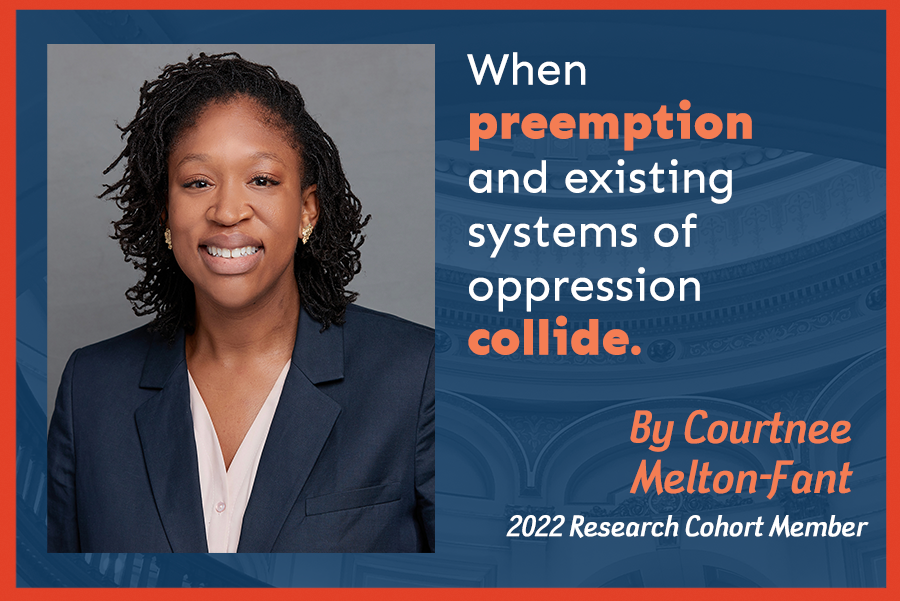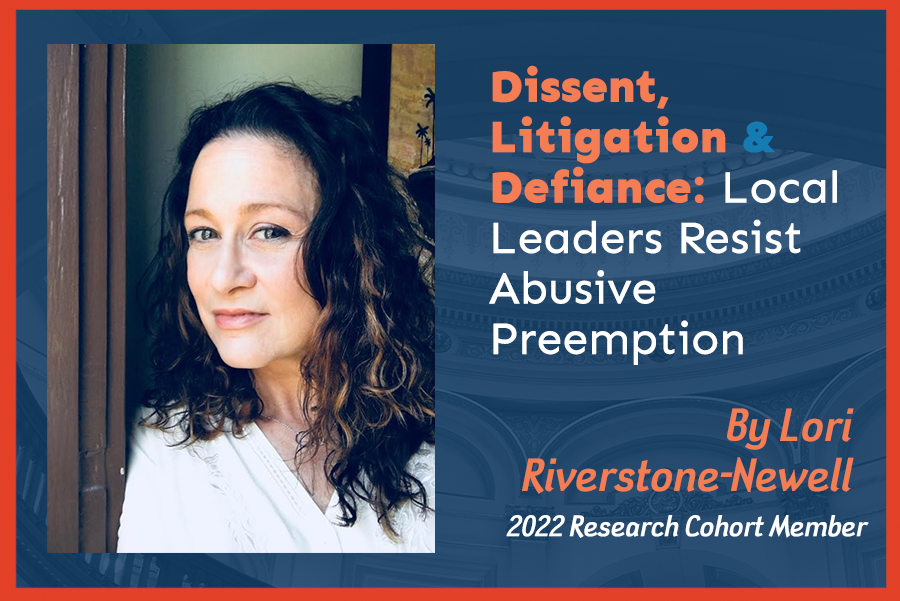Key to helping people understand the dangers of state preemption is measuring and documenting the consequences of its use. Only when elected officials, attorneys and advocates can demonstrate the harms caused by state interference can they make the case for countering, overruling or repealing these efforts to limit local decision-making. To that end, LSSC has produced reports, sponsored research and created maps that demonstrate the increased use of state preemption and the effect that has had on local communities and particularly women, people of color and low wage workers.
Featured Resources
Our new report, Preemption’s Role in Undermining American Democracy: 2024 Legislative Session Overview, tracks the 411 abusive preemption bills LSSC identified nationwide this year across 16 different issue spaces. This report explores the major areas of everyday life where lawmakers and corporations are advancing preemption in an effort to undermine democracy.
This paper is a brief update to our earlier white paper, “Preempting Progress: States Take Aim at Local Prosecutors,” cataloging attempts to curtail the discretion of local prosecutors. In this update, we also address successful efforts to push back against the efforts to strip power from local prosecutors and the communities that elected them.
This map focuses on four of these policies: protections against source-of-income discrimination, the regulation of short-term rentals, inclusionary housing programs, and rent regulation.
Increasingly, corporations and right-wing state legislators are successfully driving preemption bills that make it harder for women and women of color in particular to work with their local governments to build communities that work for them and their families.
Legislative Session Reports
Our new report, Preemption’s Role in Undermining American Democracy: 2024 Legislative Session Overview, tracks the 411 abusive preemption bills LSSC identified nationwide this year across 16 different issue spaces. This report explores the major areas of everyday life where lawmakers and corporations are advancing preemption in an effort to undermine democracy.
LSSC’s latest report, Protecting Local Democracy: 2023 Legislative Session Overview, explores all the preemption trends that played out in states across the country this past year. The report also highlights what issues advocates are most concerned about as we head into 2024.
The scope of abusive preemption bills is widening – from Death Star preemption; to efforts to undermine the power of reform-oriented prosecutors; to discriminating against transgender youth; to making it harder for local officials to successfully conduct elections. LSSC’s mid-session report explores the top trends we’re tracking so far this session, as well as a few promising victories that advocates are securing.
Despite the growing threat of abusive preemption, LSSC and our partners across the country secured important wins in 2022 – in state houses, in the courts, and in organizing spaces. We learned lessons and developed best practices that are already strengthening our work as the national hub countering abusive preemption and strengthening democracy as we head into 2023. This new report highlights some of the Local Solutions Support Center’s key activities to support the field and push back against abusive preemption in 2022.
In this report, LSSC tracks how abusive preemption was used during the 2022 legislative session by state lawmakers at the behest of corporations to undermine local authority, particularly on public health authority, LGBTQ rights, and democracy & voting rights.
SSC’s new 2022 Mid-Session report looks at how state elected officials are continuing to undermine local authority on topics ranging from educational curriculum to voting rights to labor laws to LGBTQ equality.
2021 was an unprecedented year for abusive preemption. As local elected officials and advocates sought to protect their communities from the ongoing public health and economic effects of the pandemic, they encountered preemption efforts from state lawmakers on a scale never before seen.
The Local Solutions Support Center’s (LSSC) report explores 2021 legislative activity in more detail. Overall in the session, LSSC tracked over 400 preemption bills – more than two times the number of bills tracked during the 2019 session.
Maps
LSSC has served as a hub coordinating, supporting, and disseminating empirical research into the abuse of preemption to perpetuate racial and economic disparity.
This map focuses on four of these policies: protections against source-of-income discrimination, the regulation of short-term rentals, inclusionary housing programs, and rent regulation.
Preemption of municipal broadband is complicated – even states that have a concise statute to bar telecommunications services are complicated by questions about whether the definition of such services includes broadband.
All Research Reports
The fourth edition of The Local Power & Politics Review explores how abusive preemption legislation has permeated so many areas of American policy. The new edition covers a wide range of issue areas – from abortion access to local environmental action to LGBTQ+ equality to prosecutorial discretion.
Our new report, Preemption’s Role in Undermining American Democracy: 2024 Legislative Session Overview, tracks the 411 abusive preemption bills LSSC identified nationwide this year across 16 different issue spaces. This report explores the major areas of everyday life where lawmakers and corporations are advancing preemption in an effort to undermine democracy.
In a new paper from A Better Balance, Local Solutions Support Center, and Equality Federation, we trace the local roots of LGBTQ+ equality in the United States and highlight the different types of abusive preemption that target local authority to protect LGBTQ+ individuals.
LSSC’s latest report, Protecting Local Democracy: 2023 Legislative Session Overview, explores all the preemption trends that played out in states across the country this past year. The report also highlights what issues advocates are most concerned about as we head into 2024.
The scope of abusive preemption bills is widening – from Death Star preemption; to efforts to undermine the power of reform-oriented prosecutors; to discriminating against transgender youth; to making it harder for local officials to successfully conduct elections. LSSC’s mid-session report explores the top trends we’re tracking so far this session, as well as a few promising victories that advocates are securing.
This resource from ChangeLab Solutions and the Local Solutions Support Center (LSSC), newly updated for 2023, provides advocates with the research and data they need to document the harmful consequences of preemption and advocate for repealing inequitable preemption laws.
Despite the growing threat of abusive preemption, LSSC and our partners across the country secured important wins in 2022 – in state houses, in the courts, and in organizing spaces. We learned lessons and developed best practices that are already strengthening our work as the national hub countering abusive preemption and strengthening democracy as we head into 2023. This new report highlights some of the Local Solutions Support Center’s key activities to support the field and push back against abusive preemption in 2022.
The third edition of The Local Power & Politics Review features a series of articles that explore how abusive preemption legislation has impacted states across the country. The new edition covers a wide range of issue areas – from public health policy to local environmental action to public schools to public safety to elections.
In a new paper from Local Solutions Support Center, Curricular Preemption: The New Front of an Old Culture War, we discuss the growing trend of curricular preemption and its impact on local school districts.
This resource provides advocates with the research and data they need to document the harmful consequences of preemption and advocate for repealing inequitable preemption laws.
The second edition features a series of articles that explore how some states preempted local authority across a host of issues during the pandemic.
A new white paper from LSSC explores in more detail how some state legislatures are using preemption to undermine local control of police budgeting, accountability, and management.
This new report highlights how state lawmakers in the Midwest have abused preemption to impede progress on a variety of issues that would improve the economic security and well-being of residents.
14 authors were tasked with working as advocate-researcher co-authors to produce short articles highlighting recent research findings, emerging issues, and data and research needs across seven policy fields.
A new report, Preempting Progress, examines how state interference in local policymaking prevents people of color, women, and low-income workers from making ends meet in the South.
Writing from the LSSC Research Cohort
“State takeovers of public schools and districts is one prong of a multi-prong approach to dismantling resistance to oppressive legislation,” Steven L. Nelson, Ph.D. writes.
Ramón Cruz, President of the Sierra Club, explores how some state legislatures are targeting private financial institutions in order to boycott or penalize them simply for adopting measures that consider climate change in their investments, constituting a preemption effort against proactive climate action.
Preeti Chauhan explores how some prosecutors are using their own discretion to create a less punitive and a more fair and equitable criminal legal system – and how state preemption can impact their ability to do so.
Mildred E. Warner of Cornell University explores how abusive state preemption legislation suppresses wages, undermining inclusive growth. Warner explains how we can promote more inclusive growth by raising returns to labor.
Courtnee Melton-Fant shares the story of Boxtown, a majority black neighborhood in Memphis harmed by the abuse of preemption.
“New Jersey is a place with two major stories in land use today,” Noah Kazis writes. “One led by the state against local prerogatives, and one led by localities themselves. Understanding the relationship between those two stories may teach us much about what preemption can and can’t do.”
In the name of personal responsibility, individual freedom, the free market, and partisanship, many states are preventing local leaders from protecting workers, low-income families, public health, the environment, among others, while failing to do so themselves. What is a locality to do?
Research from the Urban Institute
LSSC commissioned the Urban Institute to look at the effectiveness of local action in four areas to establish an understanding the costs of consequences when local governments are prohibited from acting. The Urban Institute released four research briefs prepared for LSSC:
We examine the use and merits of the patchwork argument across 10 policy areas and review the evidence around the patchwork argument’s merits.
In this brief, we synthesize the evidence on the effectiveness of local inclusionary zoning laws and suggest areas in which further research could help policymakers, advocates, and the public improve state and local laws regarding inclusionary zoning.
In this brief, we synthesize the evidence on the effectiveness of paid-sick-days laws and suggest areas in which further research could help policymakers, advocates, and the public improve local paid-sick-days laws.
Local minimum-wage laws can help ensure that workers can afford housing, food, and other basic necessities in locations where the cost of living is higher than in other parts of the country or state.
ReSEARCH about preemption and public health
In September 2020 Data for Progress and the Justice Collaborative Initiative published a new report, “How Cities Can Protect Public Health When States Stand in the Way.” The report details the ways that COVID-related preemption has led to a rise in state-local conflicts.
In August 2020 Public Health Law Watch published a new report, “Assessing Legal Responses to COVID-19. One chapter by representatives from Local Solutions Support Center, ChangeLab Solutions, and ThinkForward Strategies focuses on preemption and the pandemic.


































